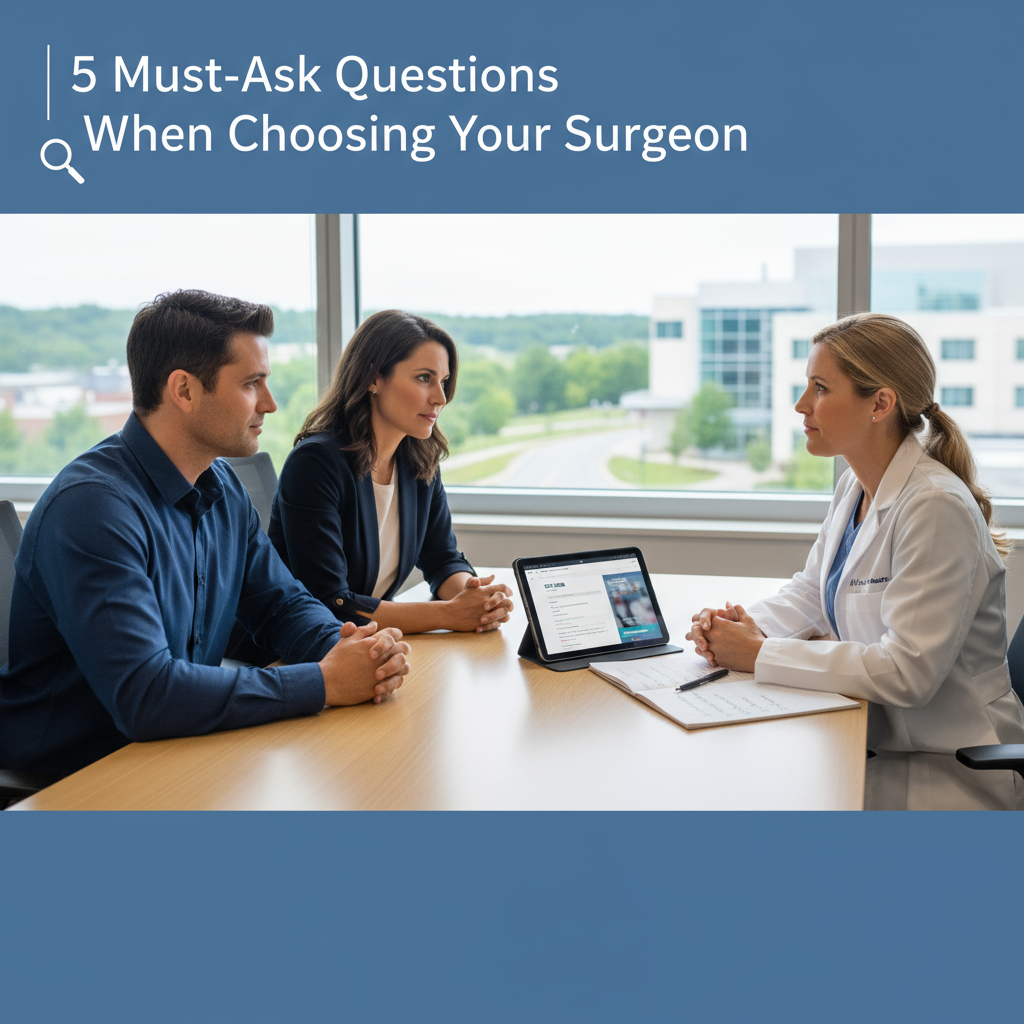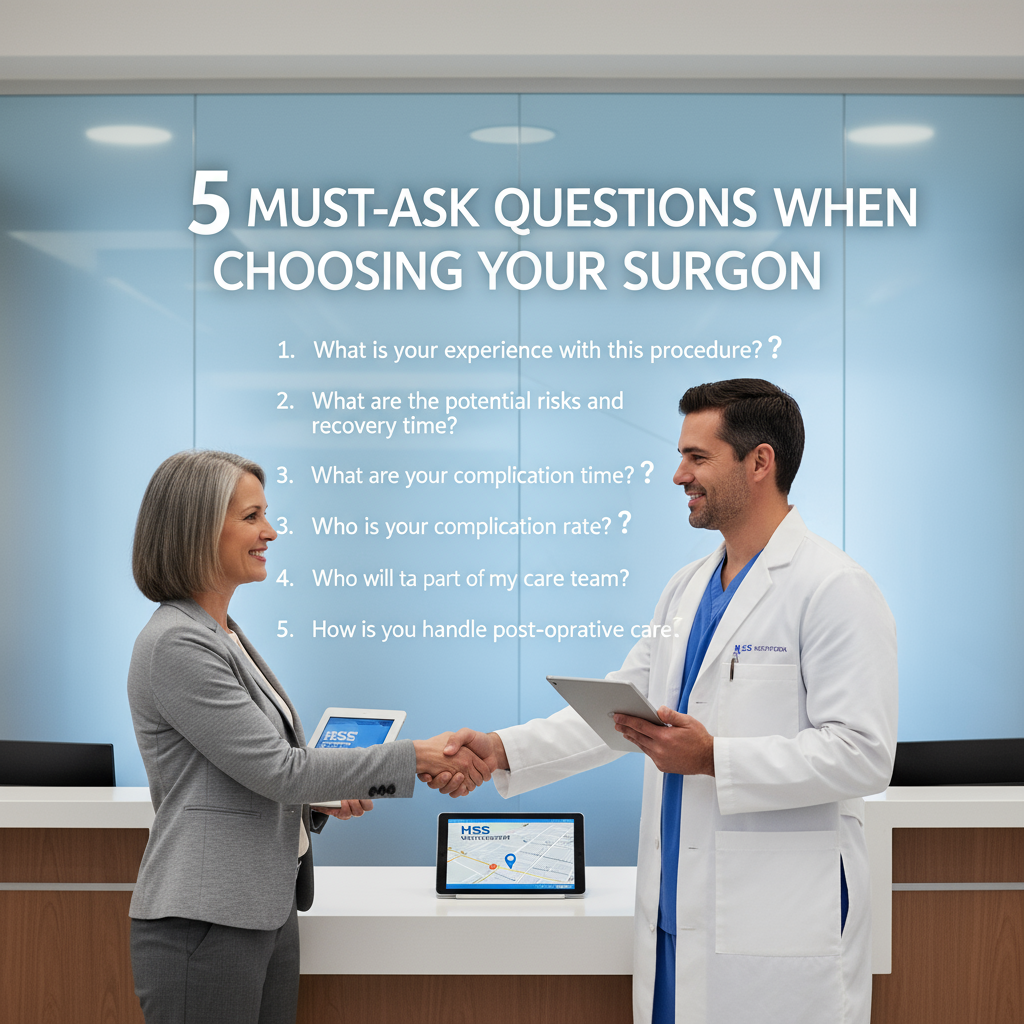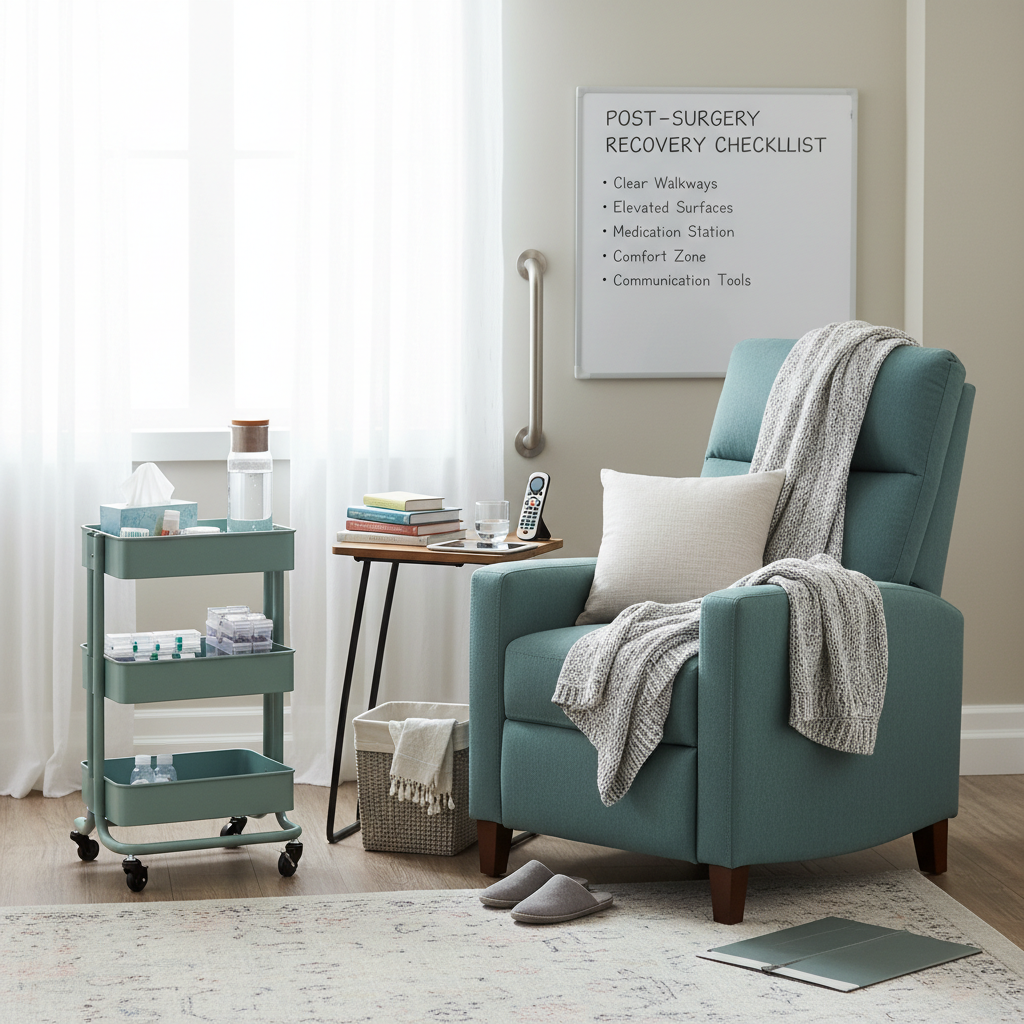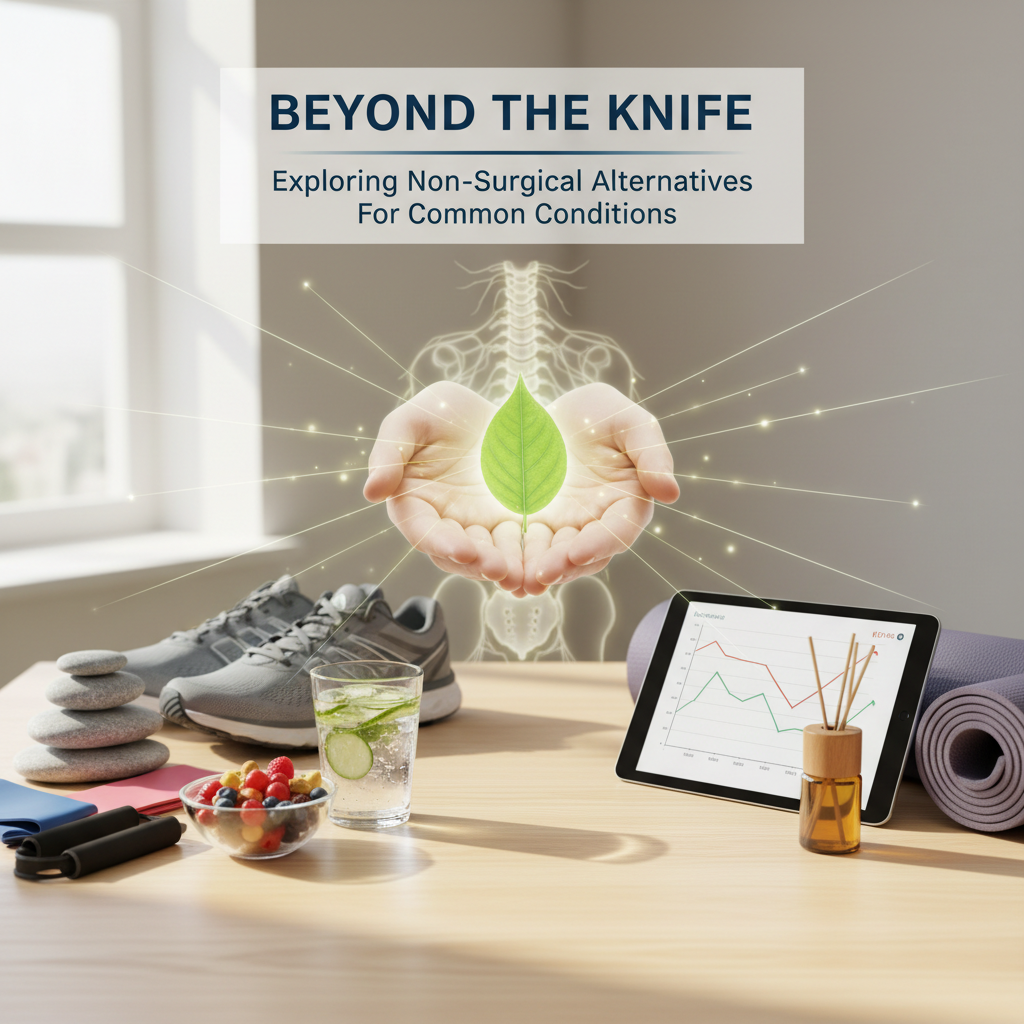5 Must-Ask Questions When Choosing Your Surgeon
To the individual facing a significant medical decision, perhaps a life-changing surgery, the anxiety can be immense. You’re not just looking for a doctor; you’re searching for a trusted expert who will be pivotal in your health journey. The daunting task of sifting through countless options, navigating complex medical jargon, and ensuring you make the absolute best choice can feel overwhelming. This is where Best Surgery Options steps in, offering a compassionate, intelligent, and highly effective platform to guide you, transforming this stressful process into one of informed confidence and peace of mind.
Beyond the Search Bar: How to Find a Good Surgeon for Your Needs
The journey to excellent surgical care begins with finding the right specialist. You might be typing "find surgeon" into your search engine, or perhaps more specifically, "how to find a good plastic surgeon" or "how to find an oral surgeon." The sheer volume of information can be paralyzing. Let’s cut through the noise and empower you with a structured approach.

Often, individuals grapple with questions like, "How do you find a good plastic surgeon?" or "How to find the best plastic surgeon?" It’s a common misconception that "best" is a universal standard. In reality, the "best" surgeon is the best for you – someone whose expertise, communication style, and patient outcomes align with your specific needs and expectations. We’ll explore five critical questions to ask that will help you confidently identify that ideal match.
1. Is the Surgeon Board-Certified in the Relevant Specialty?
This is arguably the most fundamental question. Board certification signifies that a surgeon has met rigorous standards of training, experience, and knowledge in their specific field. For instance, if you're seeking cosmetic changes, you'd want to find a plastic surgeon certified by the American Board of Plastic Surgery. For oral surgery, look for certification by the American Board of Oral and Maxillofacial Surgery.
- Why it matters: It's a stamp of approval, ensuring the surgeon has completed an accredited residency program and passed comprehensive examinations. It also often implies a commitment to ongoing education and adherence to high ethical standards.
- Red Flag: Be wary of certifications from boards that are not recognized by the American Board of Medical Specialties (ABMS) or the American Osteopathic Association (AOA).
- Best Surgery Options Insight: Our Specialist Matching service meticulously vets surgeons for appropriate board certifications, saving you the legwork and ensuring you only connect with qualified professionals.
2. What is Their Experience with My Specific Condition or Procedure?
Just because a surgeon is board-certified doesn't mean they are equally proficient in every single procedure within their specialty. A general orthopedic surgeon is different from a spinal surgeon. You might need a "back dr near me" who specializes in a particular type of spinal fusion, not just general orthopedics.
- Ask specifically: "How many times have you performed [specific procedure]?" or "What are your success rates for patients with [my condition]?"
- Look for volume: Surgeons who perform a procedure frequently tend to have better outcomes. Consider a surgeon affiliated with a reputable institution like HSS Westchester or HSS Stamford if you’re in that region, as these facilities often attract high-volume specialists.
- Patient Education Hub: Best Surgery Options provides detailed Procedure Overviews, allowing you to understand your condition and proposed treatment better, so you can ask more informed questions about a surgeon's specific experience.
3. What Are Their Patient Outcomes and Complication Rates?
This question delves into the surgeon's track record. While specific individual patient data is confidential, a reputable surgeon and their institution should be able to provide general statistics on their outcomes and complication rates for procedures they frequently perform.
- What to look for: Ask about infection rates, re-operation rates, and patient satisfaction scores.
- Consider context: Compare these rates to national averages or benchmarks (if available). A "facs doctor" (Fellow of the American College of Surgeons) often adheres to strict quality standards and reporting.
- Prediction Tools: Best Surgery Options' Outcome Prediction Tools can offer generalized insights based on extensive data, helping you set realistic expectations and understand potential risks common to specific procedures.
4. How Do They Approach Post-Operative Care and Recovery?
Surgery isn't just about the procedure itself; the recovery period is equally vital for a successful outcome. A good surgeon will have a clear, comprehensive plan for your post-operative care.
- Key areas to discuss: Pain management, follow-up appointments, physical therapy, activity restrictions, and potential complications to watch for.
- Support System: Inquire about their team – who will be your point of contact for questions after surgery?
- Recovery Guidance: Best Surgery Options offers extensive Recovery Guidance resources, helping you prepare for and navigate the post-operative phase with confidence. We emphasize a holistic approach to healing.
5. What Are the Costs Involved, and How Does Insurance Work?
Financial transparency is crucial. You need a clear understanding of all potential costs associated with your surgery, including surgeon fees, anesthesia, facility fees, and any post-operative care not covered by insurance.
- Get it in writing: Request a detailed estimate of all charges.
- Insurance verification: Clarify how their office handles insurance claims and if they are in-network with your provider. Don't forget to understand your deductibles, co-pays, and out-of-pocket maximums.
- Cost & Insurance Insights: Our platform provides valuable Cost & Insurance Insights, helping you navigate the financial complexities of surgery and ensuring you're fully informed about expenses. If you're dealing with specific immigration requirements, we can even help you find a "medical immigration exam near me" if that’s part of your overall health journey.
Making informed decisions about your surgical care can feel like a labyrinth, but with the right questions and resources, you can navigate it successfully. Whether you're looking for "cosmetic plastic surgery near me" or a highly specialized procedure, remember that your health is paramount. Best Surgery Options is designed to be your trusted partner throughout this critical process, providing tools and support every step of the way.
Remember, this carefully curated process is your safeguard. Avoid shortcuts or relying solely on online reviews, which can sometimes be misleading. A thorough vetting process, guided by these five questions, ensures you're placing your trust in competent hands.
Frequently Asked Questions About Finding a Surgeon
Q1: How important is a surgeon's bedside manner?
A1: While technical skill is paramount, good bedside manner is incredibly important for your overall experience and recovery. A compassionate, communicative surgeon who listens to your concerns and explains things clearly can significantly reduce anxiety and foster trust, leading to better compliance with post-operative instructions and a more positive healing journey. Don’t underestimate the value of a surgeon who makes you feel heard and respected.

Q2: Should I get a second opinion, and how does Best Surgery Options help?
A2: Absolutely, getting a second opinion is almost always a good idea, especially for major surgical procedures. It can confirm a diagnosis, offer alternative treatment plans, or simply provide peace of mind. Best Surgery Options specializes in Second Opinion Support, connecting you with qualified specialists eager to review your case, ensuring you have a comprehensive understanding of your options before proceeding.
Q3: What if I can't find clear information on a surgeon's complication rates?
A3: It can be challenging to find publicly available, granular complication rates for individual surgeons. However, you can look for aggregate data from the hospital or surgical center where they practice. You can also infer quality from certifications (like FACS doctor), affiliations with top-tier institutions, and honest answers to your questions from the surgeon themselves. If a surgeon is evasive, that could be a red flag. Best Surgery Options helps by filtering for highly reputable professionals who are more likely to track and share such data appropriately.
Q4: How do I verify a surgeon's credentials independently?
A4: You can verify board certification through the American Board of Medical Specialties (ABMS) website, or the American Osteopathic Association (AOA) if applicable. State medical boards also maintain licensure verification portals where you can check for any disciplinary actions. Additionally, professional organizations often list their members, such as the American College of Surgeons for "facs doctor" designations. Use these resources to cross-reference any information provided by a surgeon or their office.
Q5: Is it possible to find an excellent surgeon if I have unusual or rare medical conditions?
A5: Yes, but it requires a more targeted search. For rare conditions, you'll want a surgeon who not only has specialized experience but also operates in a facility equipped to handle complex cases. These are often academic medical centers or highly specialized institutes. Best Surgery Options excels in Specialist Matching for even the most unique needs, leveraging our extensive network to connect you with top experts in specific, niche fields.

